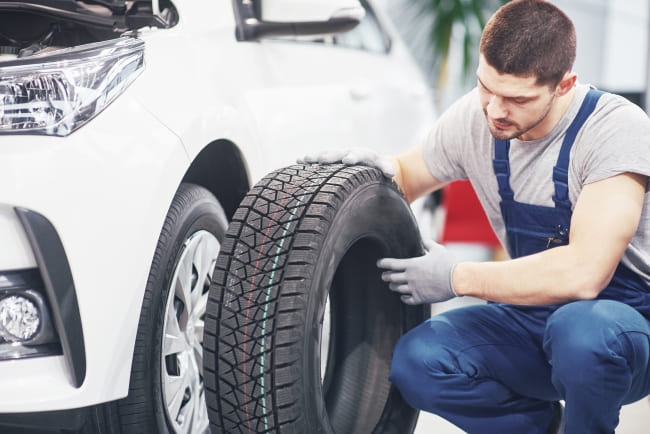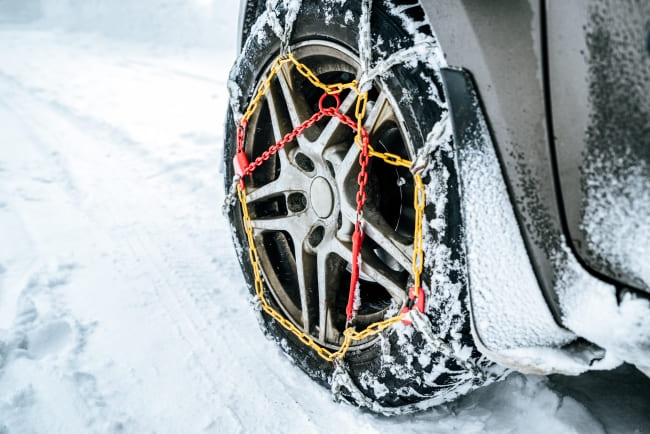Table of Contents
Snow chains or winter tyres – which should you choose?
Thanks to our mild climate, winter tyres and snow chains for cars aren’t a mandatory requirement in the UK. Only a minority of drivers choose to fit winter tyres and accessories, many of whom live in remote rural areas such as the Scottish Highlands or North Pennines. However, as weather conditions are becoming increasingly unpredictable, more drivers are weighing up their options to ensure that their car is winterproof.
If you’re planning on going overseas and driving across Europe during winter, you’ll need to be prepared for snowier conditions. Winter tyres are mandatory in a number of countries, including Sweden, Germany, Finland, Czech Republic, and Austria. Additionally, many countries recommend or require visitors to carry snow chains with them just in case.
Winter tyres vs snow chains
What are winter tyres?
Unlike regular summer and all-season tyres, winter tyres are specifically designed for optimum grip and performance in cold conditions. They are best suited for temperatures below 7°C. The rubber is made of a softer compound which allows it to remain flexible in freezing temperatures. Harder compounds, such as the ones used in summer tyres, would stiffen up, causing them to lose traction and crack.
Another key difference lies in the tread pattern. Snow tyres have deeper grooves and sipes in the tread which allow them to displace water and snow easier, as well as grip onto icy or snow-covered surfaces.
You can spot them by the markings on the sidewalls: ‘M + S’ or the three-peak mountain snowflake symbol (3PMSF). We recommend looking for products from reputable brands that comply with industry standards, such as Michelin winter tyres.

Pros:
- They offer improved traction and braking distances in cold conditions
- You can drive faster with winter tyres than with snow chains
- They can be used on all types of roads
- They only have to be fitted once each winter
Cons:
- The soft rubber compound will wear out with extended use
- As temperatures reach above 7°C, the tyres have to be switched for summer or all-season ones. Storing them can be inconvenient as they take up a fair amount of space
- The upfront cost of replacing them is more expensive than alternatives such as car snow socks and chains. We recommend that you compare prices online to find the best offers for cheap winter tyres
 RIDEX Snow chains
RIDEX Snow chains
 RIDEX Snow chains
RIDEX Snow chains



What are snow chains?
These are detachable devices that are strapped on or wrapped around the car tyres to increase traction and grip on roads covered in deep layers of snow and ice. The metallic chains are able to dig into black ice, allowing you to maintain steady control of the vehicle.
However, there are some limitations to their application. Firstly, snow chains for tyres can only be used in certain conditions because if the snow or ice is not thick enough, the metal studs can damage the roads. This means that they’ll need to be removed before driving on dry or clearer road surfaces. In addition to this, manufacturers advise against exceeding a maximum speed of 30 mph while these accessories are attached to the vehicle.

Pros:
- They are cheaper than winter tyres and can usually be adjusted to different vehicles
- They provide better grip in extreme snowy weather
- They’re easy to install and remove
Cons:
- They cannot be used in all road conditions, which means you may have to install and remove them more than once per journey
- They can break when driving at high speeds
- Standard chains can cause damage if the wheel wells are too small
- They’re quite noisy


Should I choose snow chains or winter tyres?
You should consider all of the factors before you make your choice, including the local climate, regulations, your driving habits and your budget. If you live in an area with frequent snowfall and you use your car a lot, it may be worth considering purchasing winter tyres to get you through the cold season. They are more versatile than chains and more comfortable to drive with.
On the other hand, if you can get by for most of the year with all-season tyres but are looking for a solution for when you are hit by the occasional snowstorm, snow chains may be the more cost-effective option.
Top products related to this topic:













